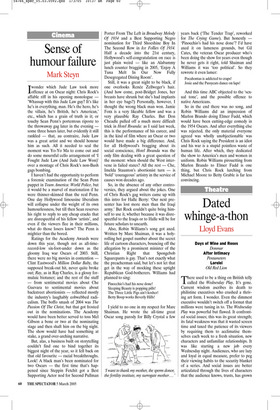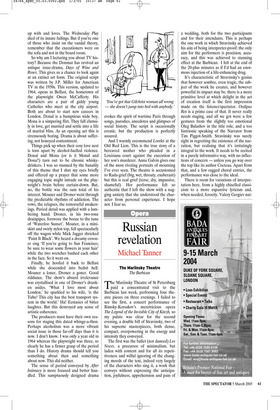Dated whinge-a-thon
Lloyd Evans
Days of Wine and Roses Donmar After Intimacy Pentameters Lorelei Old Red Lion There used to be a thing on British telly called the Wednesday Play. It’s gone. Current wisdom ascribes its death to philistine executives who crushed a thriving art form. I wonder. Even the dimmest executive wouldn’t switch off a format that millions were tuning in to. The Wednesday Play was powerful but flawed. It confronted social issues; this was its great strength; its fatal weakness was that it wasted screen time and taxed the patience of its viewers by requiring them to acclimatise themselves each week to a fresh situation, new characters and unfamiliar relationships. It was like starting a new job every Wednesday night. Audiences, who are lazy and loyal in equal measure, prefer to peg their viewing habits to the security blanket of a series. And social issues are better articulated through the lives of characters that the audience knows, trusts, has grown up with and loves. The Wednesday Play died of its innate failings. But if you’re one of those who insist on the vandal theory, remember that the executioners were on the sofa and not in the board room.
So why am I lecturing you about TV history? Because the Donmar has revived an antique issue-drama, Days of Wine and Roses. This gives us a chance to look again at an extinct art form. The original script was written by J.P. Miller for American TV in the 1950s. This version, updated to 1964, opens in Belfast, the hometown of the playwright Owen McCafferty. His characters are a pair of giddy young Catholics who meet at the city airport. Both are about to start new careers in London. Donal is a bumptious wide boy, Mona is a simpering flirt. They fall clumsily in love, get married and settle into a life of marital bliss. As an opening act this is strenuously boring. Drama is about suffering, not honeyed contentment.
Things pick up when their cosy love nest is torn apart by alcohol-fuelled violence. Donal and Mona (or is it Monal and Dona?) turn out to be chronic whiskydrinkers. I was so stunned by the banality of this theme that I shut my eyes briefly and offered up a prayer that some more engaging topic might intrude on the playwright’s brain before curtain-down. But, no, the bottle was the sum total of his interest. Moaner and Droner went through the predictable rhythms of addiction. The vows, the relapses, the remorseful awakenings. Period detail was applied with a lumbering hand. Droner, in his two-tone drainpipes, forswore the booze to the tune of ‘Waterloo Sunset’. Moaner, in a miniskirt and swirly nylon top, fell spectacularly off the wagon while Mick Jagger shrieked ‘Paint It Black’. We heard a dreamy crooner sing ‘If you’re going to San Francisco, be sure to wear some flowers in your hair’ while the two wretches bashed each other in the face. So it went on.
Finally, he hoofed it back to Belfast while she descended into bedsit hell. Moaner a loner, Droner a goner. Good riddance. The show’s absurd irrelevance was crystallised in one of Droner’s drunken asides. ‘What I love most about London,’ he sparkled to his wife, ‘is the Tube! This city has the best transport system in the world.’ Ha! Ecstasies of bitter laughter. But this destroyed any sense of artistic coherence.
The producers must have their own reasons for staging this dated whinge-a-thon. Perhaps alcoholism was a more vibrant social issue in those far-off days than it is now. I don’t know. I was only a year old in 1964 whereas the playwright was three, so clearly he has a firmer grasp of the period than I do. History drama should tell you something about then and something about now. This did neither.
The sense of period conveyed by After Intimacy is more focused and better handled. This sumptuously designed drama evokes the spirit of wartime Paris through songs, parodies, anecdotes and glimpses of social history. The script is occasionally erratic, but the production is perfectly assured.
And I warmly recommend Lorelei at the Old Red Lion. This is the true story of a bereaved mother who pleaded in a Louisiana court against the execution of her son’s murderer. Anna Galvin gives one of the most riveting portraits of mourning I’ve ever seen. The theatre is accustomed to Rada-grief (big, wet, throaty, exuberant) but this is real grief (terse, dry, impassive, shameful). Her performance felt so authentic that I left the show with a nagging anxiety that she understood the character from personal experience. I hope not. I fear so.



























































 Previous page
Previous page